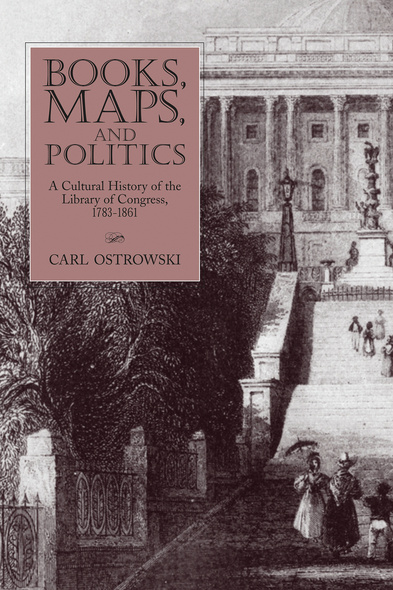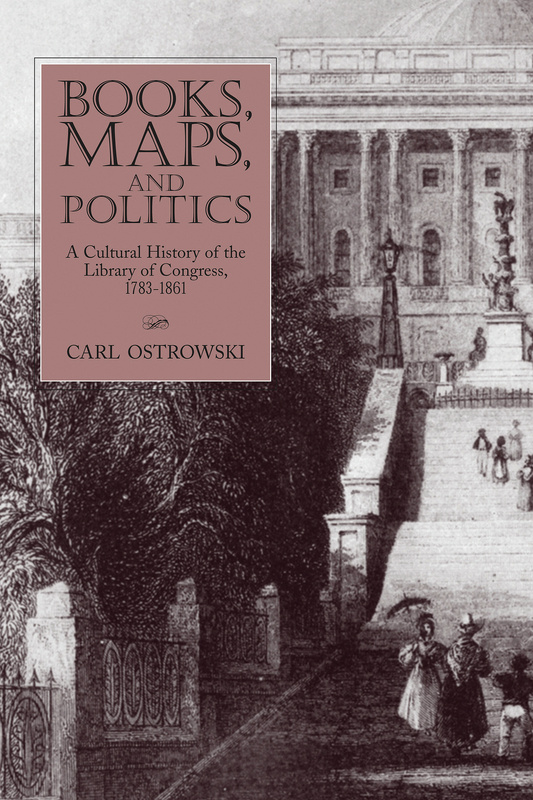Our shopping cart is currently down. To place an order, please contact our distributor, UTP Distribution, directly at utpbooks@utpress.utoronto.ca.
Books, Maps, and Politics
A Cultural History of the Library of Congress, 1783-1861
University of Massachusetts Press
Delving into the origins and development of the Library of Congress, this volume ranges from the first attempt to establish a national legislative library in 1783 to the advent of the Civil War. Carl Ostrowski shows how the growing and changing Library was influenced by—and in turn affected—major intellectual, social, historical, and political trends that occupied the sphere of public discourse in late eighteenth- and early nineteenth-century America.
The author explores the relationship between the Library and the period's expanding print culture. He identifies the books that legislators required to be placed in the Library and establishes how these volumes were used. His analysis of the earliest printed catalogs of the Library reveals that law, politics, economics, geography, and history were the subjects most assiduously collected. These books provided government officials with practical guidance in domestic legislation and foreign affairs, including disputes with European powers over territorial boundaries.
Ostrowski also discusses a number of secondary functions of the Library, one of which was to provide reading material for the entertainment and instruction of government officials and their families. As a result, the richness of America's burgeoning literary culture from the 1830s to the 1860s was amply represented on the Library's shelves. For those with access to its Capitol rooms, the Library served an important social function, providing a space for interaction and the display and appreciation of American works of art.
Ostrowski skillfully demonstrates that the history of the Library of Congress offers a lens through which we can view changing American attitudes toward books, literature, and the relationship between the federal government and the world of arts and letters.
The author explores the relationship between the Library and the period's expanding print culture. He identifies the books that legislators required to be placed in the Library and establishes how these volumes were used. His analysis of the earliest printed catalogs of the Library reveals that law, politics, economics, geography, and history were the subjects most assiduously collected. These books provided government officials with practical guidance in domestic legislation and foreign affairs, including disputes with European powers over territorial boundaries.
Ostrowski also discusses a number of secondary functions of the Library, one of which was to provide reading material for the entertainment and instruction of government officials and their families. As a result, the richness of America's burgeoning literary culture from the 1830s to the 1860s was amply represented on the Library's shelves. For those with access to its Capitol rooms, the Library served an important social function, providing a space for interaction and the display and appreciation of American works of art.
Ostrowski skillfully demonstrates that the history of the Library of Congress offers a lens through which we can view changing American attitudes toward books, literature, and the relationship between the federal government and the world of arts and letters.
A highly readable book located comfortably at the intersection of print culture studies and American library history. Ostrowski has done an admirable job of positioning his data to address the important questions currently being explored by these two scholarly communities.'—Wayne A. Wiegand, Florida State University
'The strength of Books, Maps, and Politics is its emphasis on the growth of a national print culture and its descriptions of how legislators' attitudes affected the development of the Library.'—Jane Aikin, author of The Nation's Great Library:
Herbert Putnam and the Library of Congress, 1899–1939
'Ostrowski has breathed life and context into a narrative that brings his subject into the heart of American history . . . This study is a challenging example, showing that the history of libraries in not antiquarianism but a fertile field for testing cultural hypotheses or themes that are multidisciplinary in nature. It is a model well worth studying and emulating.'—Journal of Interdisciplinary History
'This book is a good example of the ways in which library collections, their users, and their uses can shed light on larger phenomena. When those phenomena include the changing ideologies and attitudes of the shapers of a nation, the study can be significant. This one is.'—American Historical Review
'The author is temperate in his judgments, and he offers and exacting, readable account, placing the history and evolution of the Library of Congress in the context of an emerging and rapidly expanding book culture in the nineteenth-century United States.'—Journal of American History
'This study is a challenging example, showing that the history of libraries is not antiquarianism but a fertile field for testing cultural hypotheses or themes that are multidisciplinary in nature. It is a model well worth studying and emulating.'—Donald G. Davis, Jr.
Carl Ostrowski is associate professor of English at Middle Tennessee State University. He received the American Library Association's Donald G. Davis Award for an article he wrote based on part of Books, Maps, and Politics.





